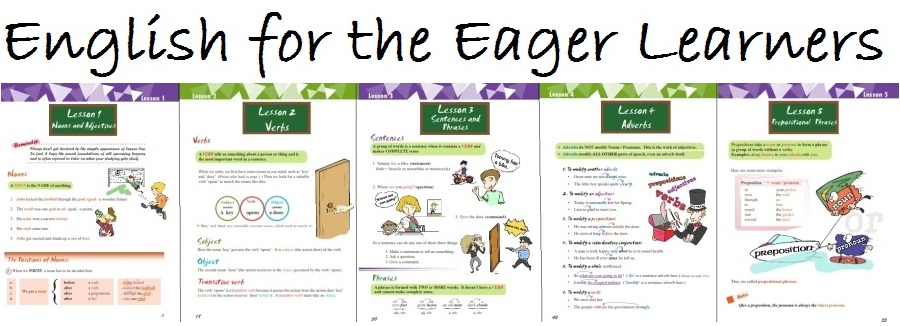A reader, after reading “English for the Eager Learners” can learn to write a straightforward sentence:
1. grammatical
2. logical
3. idiomatic
For (1), the book provides the basic, complete knowledge of grammar.
For (2), the reader is trained how to think actively for clear writing.
For (3), there are many idiomatic expressions (the set way of the language) in every passage at the end of a lesson for one to memorize and make use of.
At this point, a learner can only copy others’ work. She must not create her own expressions. This imitation stage anyone who learns an art or a craft or writing must pass through. Bach and Picasso and Shakespeare are among them.
Once the apprenticeship of writing is over, she comes out as a creative, independent writer. But to reach the highest level of writing - to write simple English, she needs real “talent” and hard work that any book can’t teach.
“Simple English is no one’s mother tongue. It has to be worked for.” - Jacques
Yes, simple English is easy reading but hard to write. Here is the greatest of all speeches that has ever been made on earth:
“You are the light of the world. A city that is set on a hill cannot be hid (hidden). Neither do men light a candle and put it under a bushel (a big container), but on a candle stick” - Bible
Another one:
“I am loath to close. We are not enemies, but friends. We must not be enemies. Though passion may have strained, it must not break our bond of affection (love)” - Lincoln
These seemingly effortless writings come from hard work and hard thinking. Please don’t mistake them for the elementary style of “Jack likes Jane.” On the other side of the coin, comes hard reading. It springs from easy writing and is as plentiful as sand everywhere.
1. grammatical
2. logical
3. idiomatic
For (1), the book provides the basic, complete knowledge of grammar.
For (2), the reader is trained how to think actively for clear writing.
For (3), there are many idiomatic expressions (the set way of the language) in every passage at the end of a lesson for one to memorize and make use of.
At this point, a learner can only copy others’ work. She must not create her own expressions. This imitation stage anyone who learns an art or a craft or writing must pass through. Bach and Picasso and Shakespeare are among them.
Once the apprenticeship of writing is over, she comes out as a creative, independent writer. But to reach the highest level of writing - to write simple English, she needs real “talent” and hard work that any book can’t teach.
“Simple English is no one’s mother tongue. It has to be worked for.” - Jacques
Yes, simple English is easy reading but hard to write. Here is the greatest of all speeches that has ever been made on earth:
“You are the light of the world. A city that is set on a hill cannot be hid (hidden). Neither do men light a candle and put it under a bushel (a big container), but on a candle stick” - Bible
Another one:
“I am loath to close. We are not enemies, but friends. We must not be enemies. Though passion may have strained, it must not break our bond of affection (love)” - Lincoln
These seemingly effortless writings come from hard work and hard thinking. Please don’t mistake them for the elementary style of “Jack likes Jane.” On the other side of the coin, comes hard reading. It springs from easy writing and is as plentiful as sand everywhere.
